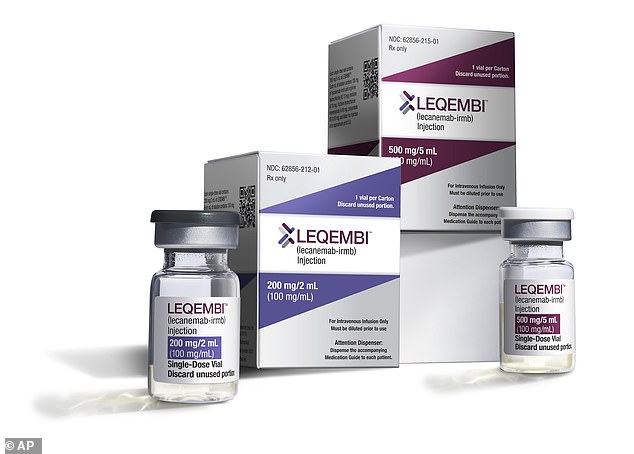The NHS is “a long way off” from being able to provide a new class of Alzheimer’s drugs to patients if approved, research suggests.
The UK is about to decide whether early treatments that slow the early signs of the disease are safe and effective.
Regulators are expected to rule on lecanemab in the coming weeks and donanemab later this year, and both treatments have already received the go-ahead in the United States.
Approval would mark a major change in treatment because it targets one of the known causes of Alzheimer’s, rather than simply helping to relieve symptoms.
But experts have warned that a lack of adequate testing means the NHS is facing a flood of patients wrongly assumed to have the disease.
The UK is about to decide whether the first treatments that slow the first signs of the disease are safe and effective

Regulators are expected to rule on the Alzheimer’s drug lecanemab (pictured) in the coming weeks and another donanemab later this year.
They said there is a “clear and urgent” need to improve NHS screening to determine who can benefit from new Alzheimer’s drugs.
Researchers from University College London (UCL) and Queen Mary University of London examined clinical notes from 1,017 NHS patients in five areas of London, including 517 patients assessed in memory services and 500 in a specialist cognitive service.
Nearly a third (32 percent) of patients in memory services would likely be referred as potential candidates for medications.
Almost all had brain scans, but only two patients had lumbar punctures, which confirm whether a patient had amyloid and tau proteins, associated with Alzheimer’s.
This proportion increased in specialty clinics where more testing is available, with nearly two-thirds (62 percent) obtaining the necessary fluid biomarker testing.
Once those who would not be eligible for the treatments due to frailty and other problems, they found that four in ten were potentially eligible for treatment with the new drugs.
In an article published in the Journal of Neurology, Neurosurgery and Psychiatry, researchers said this amounts to just 14 percent of all cases reviewed in specialized cognitive clinics.
Meanwhile, the lack of biomarker testing using lumbar punctures for patients seen in community memory clinics means that nearly a third (30 percent) of suspected cases are not Alzheimer’s.
The researchers said NHS systems “need to be set up to address this potentially large mismatch between referral and final eligibility to avoid overwhelming services”.
Alzheimer’s disease is the most common cause of dementia, accounting for up to 80 per cent of the 944,000 people living with dementia in the UK.

Alzheimer’s disease is the most common cause of dementia, accounting for up to 80 per cent of the 944,000 people living with dementia in the UK.
Currently, the only drugs available for Alzheimer’s are to treat symptoms, but recent clinical trials show that new therapies (which use monoclonal antibodies to eliminate amyloid plaques that form in the brain) can slow the progression of the disease.
Two “disease modifying therapies” (DMTs) have been granted “breakthrough therapy” designation in the UK and could be available to patients by the end of the year, pending MHRA approval and following NICE.
David Thomas, head of policy and public affairs at Alzheimer’s Research UK, said cheaper and scalable diagnostics, such as blood tests, were urgently needed.
He said: “There are finally new Alzheimer’s drugs on the horizon, but for their full potential to be realized, health systems must be able to offer people with symptoms of dementia an accurate and early diagnosis to find out whether these treatments could benefit them.”
‘As this research shows, the NHS is a long way from being able to carry out these tests routinely.
“Whoever forms the next government must urgently invest in the NHS, to ensure we have the right diagnostics and workforce to help identify people who could benefit from new treatments should regulators deem them safe and effective.” .
A report published earlier this year by the National Health Service in England stated that “timely diagnosis of dementia is vital”, adding that new blood tests could soon replace lumbar punctures in diagnosing the disease.
It predicts that the number of patients who could be eligible for the drugs ranges between 50,000 and 280,000, with an estimated cost of between £500 million and £1 billion a year.
However, actual costs will depend on drug prices agreed for England.
The document said: “To be eligible for treatment, patients will need an initial MRI and then a PET-CT scan or lumbar puncture confirming the presence of beta-amyloid proteins in the brain, which are associated with Alzheimer’s.” . disease process.’
Dr Alex Osborne, policy director at the Alzheimer’s Society, said: “These drugs are only available to people in the early stages of Alzheimer’s disease, and more than a third of the 982,000 people living with dementia in the “The United Kingdom does not have a diagnosis.” absolutely.
“That’s why Alzheimer’s Society is calling on the NHS to publish plans for how it will bring innovative new treatments to people who need them, with a specific focus on diagnosis and investment in the tools and workforce needed to identify eligible patients.


